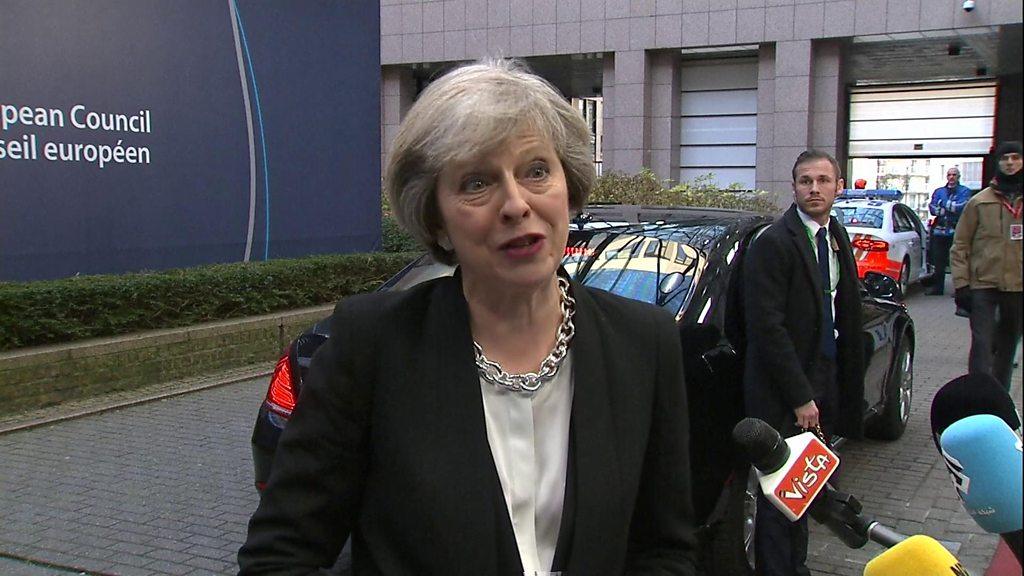Brexit: shock, inertia, locus and leverage
- Published
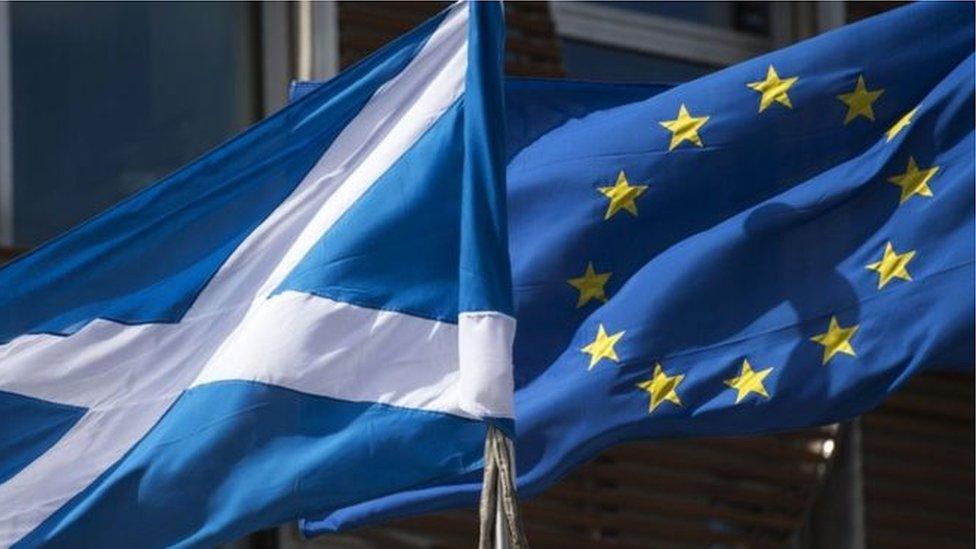
Six months after the EU referendum, the list of what we know is very short. The big questions go unanswered.
If the Scottish government is to secure a special status within the EU and the UK, it has some negotiating strengths but lacks a formal role.
The UK government has to be persuaded to take on the Scottish argument, either as an opportunity or under threat of another independence vote.
Six months on since the Brexiteers won the referendum on membership of the European Union, and what have we learned? First, that they didn't have a plan.
Nor do they appear to have one now. A report from "The UK in a Changing Europe" academic grouping reflects on where the government was at the height of summer. Stunned by "shock and inertia", they reckon.
They go on to assess what we know so far, external, and most of it is made up of what we don't know.
What did the electorate mean by a 52% 'leave' vote? The polling isn't clear, says Professor John Curtice. It doesn't frame the questions consistently to take account of the complexity of the choices.
So what does Brexit mean? It means Brexit, of course.
Yes, Prime Minister, but what will it look like?
It'll be red, white and blue, she says.
Like the British flag. Or the French, Dutch or American ones.
Seeking allies
In perhaps the biggest strategic choice, does Downing Street want migration controls to take precedence over access to the single market? Probably, but possibly not.
What will happen to the rights of EU nationals working now or wanting to work in the UK in the next couple of years? Or of UK nationals resident in other countries? That will have to be negotiated.
Will the UK continue to pay into the EU budget? Possibly. That depends which cabinet minister is doing the talking.
What role will devolved administrations have in the process? Their views will be fully taken into account, but may then be ignored.
Can the UK government find negotiating allies among the other 27 members of the EU? Not much sign of that. Overtures to them seem to have had the opposite effect, of driving the 27 into a unified position, for now at least.
A new universe
What will the economic consequences of Brexit be? The pound has weakened. Otherwise, the short-term forecasts have been proven very wrong, in that growth and consumer confidence have held up. So when most economists are still agreed that the medium-to-long-term outlook doesn't look good, are you going to believe them?
What special deal has been offered to Nissan to ensure it invests in its Sunderland manufacturing plant? They're not saying. So we don't know how that will apply to other firms or sectors.
Will the UK now be able to sign up to improved trade deals with non-EU nations? They've asked. It can't happen until Britain's leaves the EU. Some other countries would like a deal. No-one sees one happening quickly.
But then there's President-elect Donald Trump. Once he is resident in the White House, a new universe of possibilities opens up.
Will ministers decide on the Brexit process, or will they have to ask for the backing of Parliament, and maybe of the Scottish Parliament? That one is still with the Supreme Court. The 11 justices will get back to us in January.
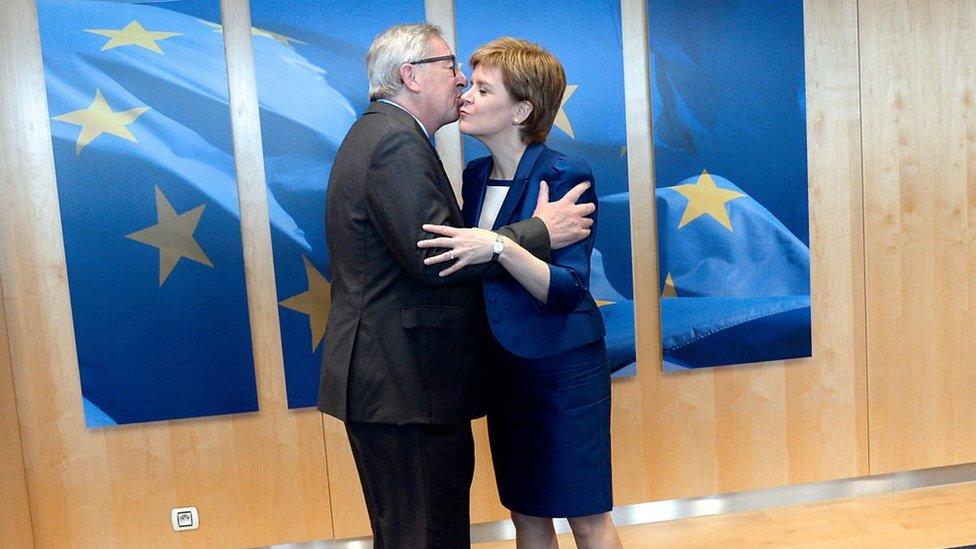
European Commission president Jean-Claude Juncker welcomed Scotland's First Minister Nicola Sturgeon at a recent meeting
When will we find out the answers to these questions of UK government strategy? By the end of March. Theresa May has said she will trigger the start of the two-year Article 50 process by then. That's if the Supreme Court lets her.
That timetable runs smack into tricksy elections for France, Germany and the Netherlands. And starting the process doesn't mean the strategy will be set out then. A one-sentence letter will suffice, probably.
Even if that happens on schedule, the academics' report observes that the process doesn't start there. Probably of more significance than the UK government's opening position is the response from the other 27 EU members.
If they simply restate their insistence on the four freedoms - movement of goods, services, capital and people - as a condition for having market access, we could be heading for a big hiatus.
'Fantasy Island'
"The likely scenario is one of familiar EU negotiating territory: long interludes of tedium and small print, interspersed with episodes of late-night brinkmanship, leading eventually to a compromise that satisfies no-one but with which everyone can live," Angus Armstrong writes for The UK in a Changing Europe.
"However, if the continental consensus is that the UK is still living on Fantasy Island, we could be heading for a showdown sooner than anyone expects."
It is to the credit of the Scottish government that it has at least shared its thinking on how to prepare for that. This week, Nicola Sturgeon published the thinking, Scotland's Place in Europe., external Whatever else you think about it, it's a more substantial, detailed and coherent offering than anything we've yet heard from Whitehall in six months.
Of course, critics don't rate it all that highly. As you'd expect. Where it seeks a special deal for Scotland, within the UK and also within the EU's single market, the precedent of the Faroe Islands, within the Danish realm but partly autonomous, doesn't suggest that an application for market access will get far or fast-tracked.
And it's no secret that the Madrid government has no intention of letting Scotland, as a part of an EU member state, carve out a special status. It has Catalonians and Basques on its mind.
Faroe dealings
Others on the continent seem happy to see Scotland set out its stall - partly because it partly fills a vacuum, also that it articulates a support for the European ideal and harmony that contrasts with Westminster's understanding of what the union is meant to be about, and partly because it puts Downing Street into a more difficult negotiating position.
There are two keys to pushing further with the Scottish government's approach. One is locus, the other leverage.
Does the Scottish government have a locus in the Brexit negotiations? It does in the apparatus created within the UK for devolved administrations to feed in their views. The effectiveness of those ministerial forums depends on how hard Downing Street is listening and willing to act. (If the Supreme Court agrees with the Scottish government that Holyrood should have a role, that may change.)
But beyond that, the Scottish government has no locus in the Brexit negotiations. The EU is a club of 28 member states. It can only become a club of 27 by negotiation of those members.
So in Brussels, they are interested to hear what Scotland has to say, but acknowledge that it is up to the British government to propose a special deal for Scotland, or Northern Ireland, or indeed, London's financial district.
Special status
What then of negotiating leverage? By taking an informal route to the other 27 member states, what does Scotland have to offer? The inference of Nicola Sturgeon's offer is that a deal with Scotland would be good for true Europeans and bad for Eurosceptic England. In other words, a special status for Scotland could weaken the UK government's negotiating position.
The converse of this argument is explicitly stated by Scottish Conservatives - that if the SNP government would only work with Whitehall, it would maximise the strength of the UK negotiating position.
Does the Scottish government have leverage over the UK government, with which to gain concessions of more devolved powers and that proposal of a special and distinct relationship with the EU?
Part of the reasoning behind the 'Scotland's Place in Europe' is to carve out an argument that appeals to the UK government, rather than threatening it.
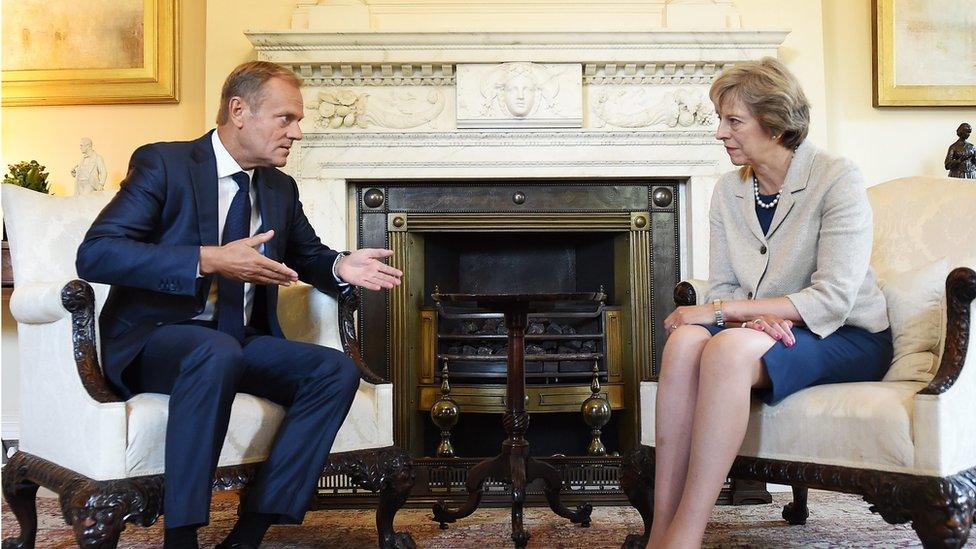
Theresa May with European Council president Donald Tusk
If Theresa May takes the Scottish government's document at its word, she could see a special status for Scotland as a way of squaring the Brexit circle, or at least of limiting the damage that could be done by a hard Brexit.
That is being argued by Professor Anton Muscatelli, principal of Glasgow University and chairman of the Scottish government's advisory council on Brexit. He wrote this week that a Scottish position within the European market should appeal to the UK government as it would "at least partially avoid the net loss of trade and economic activity that a hard Brexit would imply, as the UK maintains a link to the single market through Scotland.
"In particular, for key sectors like financial services and legal and administrative services, there would remain a viable route to vital EU markets for Scottish and UK businesses."
The idea makes Scotland sound something like a big special enterprise zone, a conduit, or a back door, and requires a weakening or blurring of boundaries at a time when there is pressure within the UK and across Europe to put up boundaries to migration.
Who's risk?
There is, of course, another element of leverage - that if Nicola Sturgeon doesn't get special measures for Scotland, the prime minister can expect another independence referendum in Scotland.
But who's risk is that? The risk for Theresa May that she could be the prime minister who "loses the union". Or there's the risk for Nicola Sturgeon that she would lose again.
The dynamic has changed. In 2014, it was the 'Yes' campaign to independence in relatively benign financial times, versus a Conservative-led government with a leadership team struggling to articulate the case for a one-nation Britain.
The same arguments might well come from Theresa May. But behind her is a party and a Westminster political environment in which the English nationalist genie has been released. Again, we don't know, but the possibility of being met with a "good riddance" from south of the Border is stronger than it was.
- Published20 December 2016
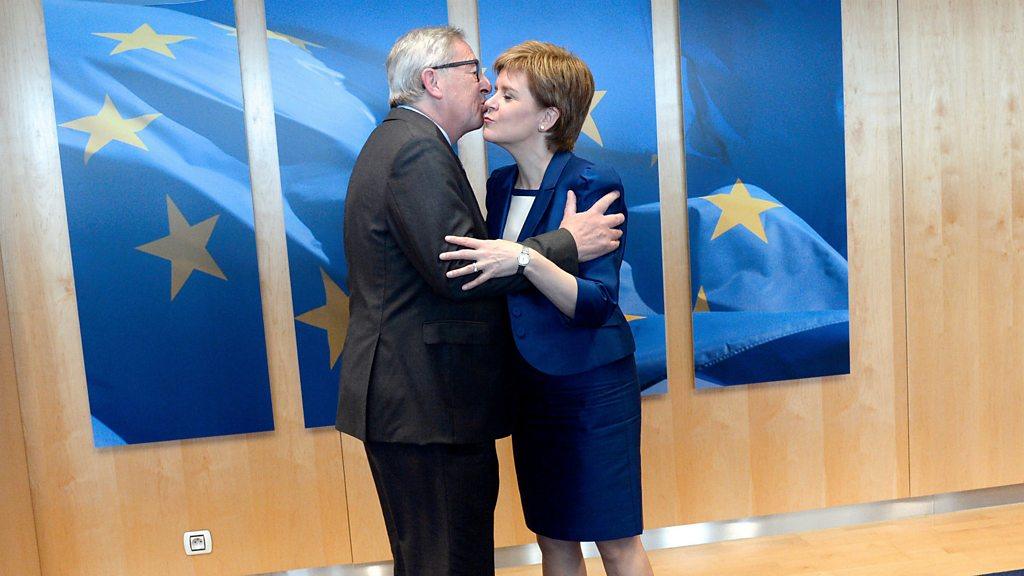
- Published15 December 2016
